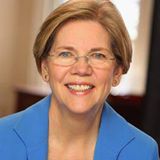Corruption has seeped into the fabric of our government, tilting thousands of decisions away from the public good and toward the desires of those at the top. And, over time, bit by bit, like a cancer eating away at our democracy, corruption has eroded Americans' faith in our government.
I know that's a stark assessment. But I'm not here to describe the death of democracy. I'm here to talk about fighting back. I'm here because I believe that change is hard, but change is possible.
Change can start with reforming how our largest companies operate. Last week, I introduced the Accountable Capitalism Act, which would restore the once-common idea that giant American corporations should look out for a broad range of American stakeholders. By requiring our largest companies to seat workers on their boards, limiting the ability of executives to get rich quick off short-term stock price bumps, and giving shareholders and Directors a real say in corporate political spending, this bill could go a long way toward restoring real economic democracy in America. And in the process, it would ensure that when American businesses engage with our government, they are speaking on behalf of their entire communities and not simply as megaphones for the wealthy and the powerful.
Getting American corporations to start acting like responsible American citizens is an important first step toward limiting corruption. But broader changes are needed.
This is an aggressive set of reforms that would fundamentally change the way Washington does business. These reforms have one simple aim: to take power in Washington away from the wealthy, the powerful, and the well-connected who have corrupted our government and put power back in the hands of the American people.
We can do this. We must do this. And when we do, we will restore the faith of the American people not just in our government, but faith in democracy itself.
The recent explosion of big political spending has delivered a gut-punch to our democracy. I do what I can by not taking any PAC money or any money from federal lobbyists. There's a lot of work to do on campaign finance, starting with overturning Citizens United. But that's not nearly enough. The corrupting influence of big money in Washington reaches much further than political campaigns.
Big money eats away at the heart of our democracy. Over the last few decades, it has created a pervasive culture of soft corruption that colors virtually every important decision in Washington.
Consider a couple of examples:
First, the rich and powerful buy their way into Congressional offices. Exhibit A: Mick Mulvaney. After he left Congress, Mulvaney told a roomful of bankers that he had a rule in his office: if a lobbyist didn't give him money, the lobbyist didn't get a meeting -- he met only with those lobbyists who ponied up for his campaign war chest. Today, Mulvaney is President Trump's head of the Office of Management and Budget and the person running the Consumer Financial Protection Bureau. And when he made these comments right out in public with the press listening in, Trump and pretty much every Republican in Washington just shrugged.
The rich and powerful also offer up some pretty nice gifts for public servants to do their bidding. In the early 2000s, Congressman Billy Tauzin started pushing an idea: expand Medicare to cover prescription drugs. Good for seniors -- in fact, life saving for some. But also very good for Big Pharma -- more prescriptions filled, more money coming in.
And it might all have landed there, with seniors getting drug coverage and drug companies selling more drugs but Big Pharma wanted more. Number one on their list was a flat prohibition on the worrisome possibility that the government might actually negotiate for lower drug prices. And Billy delivered, which I'm sure had nothing to do with the more than $200,000 in campaign contributions the Congressman received from the drug industry.
Today, Big Pharma rakes in billions from seniors on Medicare while charging sky-high prices for the drugs they need -- and no one in government can negotiate those prices. And what happened to Billy?
In December of 2003, the very same month the bill was signed into law, PhRMA the drug companies' biggest lobbying group dangled the possibility that Billy could be their next CEO.
In February of 2004, Congressman Tauzin announced that he wouldn't seek re-election. Ten months later, he became CEO of PhRMA -- at an annual salary of $2 million. Big Pharma certainly knows how to say "thank you for your service."
Sometimes the payoff comes upfront. Goldman Sachs handed Gary Cohn over a quarter of a billion dollars on his way out the door to become the head of President Trump's National Economic Council. A quarter of a billion dollars to help quarterback a tax package that included giveaways worth just over a quarter of a billion to Goldman -- in the first quarter of 2018 alone. That's quite the return on investment for Goldman Sachs. For the taxpayers who paid Mr. Cohn's salary and were under the mistaken impression that Mr. Cohn was working for them, the return was not so good.
Next Page 1 | 2 | 3 | 4 | 5 | 6 | 7
(Note: You can view every article as one long page if you sign up as an Advocate Member, or higher).





